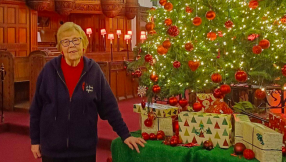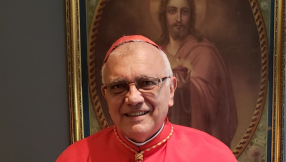
It's an inspiring story during a time of war. The 'Ghost of Kyiv', a Ukrainian fighter pilot, had apparently bravely shot down more than 40 Russian aircraft before being tragically killed in an air battle on 13 March. Days before, on 11 March, the 'Ghost' was pictured in his cockpit with a caption, "Hello occupier, I'm coming for your soul."
The only problem is that none of it was true. Despite one of the videos purporting to show the Ghost of Kyiv being shown to be from a video game, the Ukrainian government continued to insist that he was real.
But they have now admitted that it was all made up, with Ukraine's air force command writing on Facebook, "The ghost of Kyiv is a superhero-legend, whose character was created by Ukrainians!"
"The #GhostOfKyiv is alive. It embodies the collective spirit of the highly qualified pilots of the Tactical Aviation Brigade who are successfully defending #Kyiv and the region."
This is not the first time that Ukrainians have admitted they are just making things up. Indeed, they are very good at it. Whatever is going on on the ground, they have certainly won the social media war.
There is an old adage that truth is the first casualty of war. But in the face of a brutal invader, does it matter if the Ukrainians can lie better than the Russians? One tweet stated: "True or not, this is EXACTLY the kind of inspiring story the resistance needs right now."
But of course it matters. We don't get to make up our own facts. Once you give up on the idea of truth, then everything is up for grabs. If our motivations, actions and ideals are based on lies, then what are we fighting for? The trouble is that by lying about some things, we give people reason to doubt everything we say. And those who want to deny the atrocities being committed by some of the Russians are given the justification they need. After all, in a post-truth world, everyone can now choose their own facts.
Meanwhile in the US, the Biden administration is to set up a Disinformation Governance Board to fight the spread of disinformation online. Many have noted the similarity to George Orwell's idea of The Ministry of Truth in his prophetic novel, 1984. The novel's hero, Winston Smith, works in The Ministry, whose role is to control information coming from news, entertainment, arts and education.
Authoritarian governments tend to have Ministries of Truth. Of course, we should all want to combat disinformation, but is a government ministry the way to do so? Nina Jankowicz, the newly appointed head of the Disinformation Governance Board, once argued that the Hunter Biden laptop story was part of a disinformation campaign by the Russians. The irony is not lost.
We are now living in a world where Big Tech companies have their own disinformation teams, choosing truth according to their own political and philosophical views; where Microsoft Word and Google are seeking to monitor our language so that we don't use offensive terms like 'mankind' or 'landlord'; and where telling lies for the sake of truth is considered acceptable.
Inconvenient truths (to the powerbrokers) can easily be dismissed as MDM (mis-, dis- and mal-information). If you control the Ministry of Truth, then the truth is whatever you want it to be.
What should the Christian response be to this great confusion about truth? We could be like the Psalmist who in his haste argued that 'everyone is a liar" (Ps 116:11). Or we could accept what Jesus says – that it is the devil who is the father of lies (John 8:44). We could resolve to always speak the truth in love (Ephesians 4:15). We could become known for our integrity.
Just as society no longer trusts the media because it is assumed that everyone is lying, wouldn't it be wonderful if people recognised that we spoke the truth – even when it seems harmful to us?
Sadly, too many churches and Christian organisations have their own version of 'the Ministry of Truth'. In order to protect the brand, we can spin, distort and ignore as much as any in the 'world'.
But there is a better way - the way of the Christ we profess to follow. Jesus promised that we would be made holy in the truth (John 17:17). We should wear the belt of truth (Ephesians 6:14). We know that lying lips are an abomination to the Lord (Proverbs 12:22). We know that love rejoices with the truth (1 Corinthians 13:6). We know that God's word is truth. And we know that the truth is found in a person – Jesus Christ (John 14:6).
Our world needs freedom, but freedom cannot come by lies. Inspiring stories that are myths are useless. We won't be set free by Disney or Hollywood. There is only one truth that can set us free – the truth of the Risen Christ. He is no ghost. He is for real. Indeed, he is the ultimate reality. The world desperately needs Christians to be ministers of that truth.
David Robertson runs The ASK Project in Sydney, Australia. He blogs at the Wee Flea.













